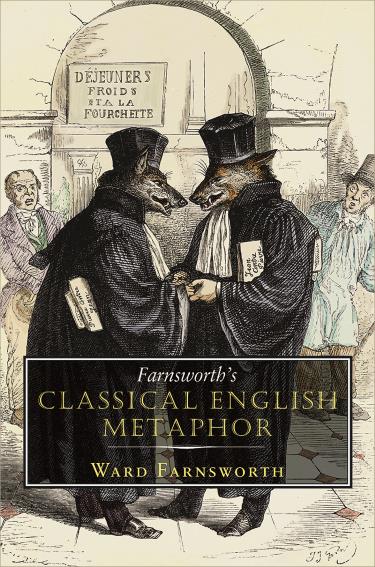

Every household should have a copy.
Interested in argument? Try this.
Interested in philosophy? Try this and this.
Interested in rhetoric? Try this.
Interested in law? Try this. And this.
Interested in chess? Try this, and also this, or visit the online version here.
Welcome to the webpage for Classical English Metaphor.
Classical English Metaphor is a set of lessons in the art of comparison. The book shows how masters of metaphor and simile have used those devices to remarkable effect in the best English literature and oratory. It is a sequel to Classical English Rhetoric, and is similar in format. It is also another book (like The Legal Analyst) about tools for thought. Metaphor is both a way to communicate more powerfully and a language that we use to interpret and explain the world to ourselves and to others. This book is a detailed study of how comparisons have been used for all those purposes by great writers, thinkers, and students of human nature.
The book is available from amazon.com here.
What people are saying about the book:
More than analysis, more than reference, this work is astoundingly rich and dense—an education in itself, and highly enjoyable. —Mark Helprin, author of Winter’s Tale and A Soldier of the Great War
If you seek edification about the craft of writing, rarely has instruction been administered so delightfully.
—George F. Will, syndicated columnist
A superb job. Figuratively speaking, this is the best book that can be found. —Bryan A. Garner, author of Garner’s Modern English Usage
An absolutely fascinating, informative, unique, and absorbing read from first page to last. —Michael Dunford, Midwest Book Review
Another invaluable rhetorical resource from Ward Farnsworth, Classical English Metaphor would also make a wonderful textbook if English Departments should ever return to the study of English Literature.
—Richard A. Lanham, Professor Emeritus of English, UCLA. Read his full review here.
Ward Farnsworth is a witty commentator...It’s a book to dip into and savor. —Jan Gardner, The Boston Globe
A truly wonderful book. Highly recommended! —Erin McKean, Editor, Verbatim: The Language Quarterly and wordnik.com.
Like metaphors? Buy this book. —Micah Mattix (full review in The Weekly Standard here.)
Understand metaphor, understand the world, understand yourself...I could quote to you for the rest of the afternoon without exhausting the richness and sophistication of Mr. Farnsworth’s admirable collection...The more we understand and make use of the possibilities of metaphor, the more profound understanding we will achieve. —John E. McIntyre, The Baltimore Sun
As we all know, the best laid plans of mice and academics mean shit in the end. So how does Farnsworth, in a practical sense, approach the enterprise? Is he successful? . . . The answer [is] a resounding hell yes. Farnsworth’s Classical English Metaphor is a feat of elegant demystification. —Jonathan Russell Clark, The Millions
If you love language, or have a particular flair for the dramatic in your speech, this is the book for you. If you are looking for a great Father’s Day gift in advance (Nice initiative! Good on you!) or the perfect graduation gift for that English, philosophy, history, or really any humanities major in your life, this is the book for you. —Porter Square Books
Farnsworth’s Classical English Metaphor is an in-depth, expansive guide to the breadth of metaphor and simile in the English language.... This engaging volume on the evolution of English grammar and style weaves together a range of English-language literary and historical texts to demonstrate the complex ways in which one can conceptualize and understand the wider world through illustrative comparison. Summing Up: Highly recommended. All readership levels. —H.E. Green, ALA Choice Magazine
A book to linger in, like an imaginatively interactive museum. —Patrick Kurp, Anecdotal Evidence blog
I want this book to be beside my bed for years to come, a treasure-house of the liquid magic of words. —Simon Winchester, author of The Professor and the Madman
It is one of those books that inspires a reviewer to sing the delights of dipping in at random or of setting by a bedside for insomniac diversion. . . [I]t gives emphasis not to the genius of individual authors, but to the potential of the English language. —Owen Boynton, Essays in Criticism